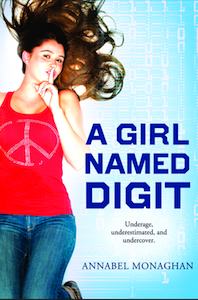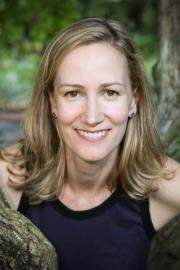Interview with Annabel Monaghan, author of new YA novel, A Girl Named Digit
- Tuesday, 05 June 2012 14:06
- Last Updated: Tuesday, 12 June 2012 13:03
- Published: Tuesday, 05 June 2012 14:06
- Hits: 6559
 You know that feeling you get from holding a new book in your hands, excited by the promise of the first few pages? That’s how I felt when I first read A Girl Named Digit by Annabel Monaghan. It was a Saturday morning. My Kindle and I crept downstairs in the dim morning light and hid under a blanket on the far end of the couch in the sunroom, pretending that we were still asleep. In that way, I disappeared from my family’s radar for the better part of the morning, and by the time they found me and begged for breakfast, I was already hooked on Digit.
You know that feeling you get from holding a new book in your hands, excited by the promise of the first few pages? That’s how I felt when I first read A Girl Named Digit by Annabel Monaghan. It was a Saturday morning. My Kindle and I crept downstairs in the dim morning light and hid under a blanket on the far end of the couch in the sunroom, pretending that we were still asleep. In that way, I disappeared from my family’s radar for the better part of the morning, and by the time they found me and begged for breakfast, I was already hooked on Digit.
And that was good news, because before reading her novel, I was already hooked on Annabel Monaghan.
Annabel and I met in a novel writing workshop at Sarah Lawrence College in the Fall of 2010. She was there to workshop a project called Digit, and since her novel was completed and the rest of ours were not, we read her manuscript first. In person, Annabel is funny and self-deprecating and humble and smart. She’s the one you want to sit next to in class so that you can pass notes back and forth and give each other meaningful eye rolls, as if a continuing education course at a local college is the same setting as your high school biology lab. (Which, in a way, it is.) By week two, we had our own little inside jokes. As I sank into my couch, I desperately hoped that her book would live up to the real her.
We were told to read the first 50 pages for class. I got to 51 and never stopped. Here’s a plot summary: Farrah "Digit" Higgins may be going to MIT in the fall, but this L.A. high school genius has left her geek self behind in another school district so she can blend in with the popular crowd at Santa Monica High and actually enjoy her senior year. But when Farrah, the daughter of a UCLA math professor, unknowingly cracks a terrorist group's number sequence, her laid-back senior year gets a lot more interesting. Soon she is personally investigating the case, on the run from terrorists, and faking her own kidnapping-- all while trying to convince a young, hot FBI agent to take her seriously. So much for blending in.
I am delighted to tell you that Annabel Monaghan’s first novel for teens, A Girl Named Digit, released on June 5, was just named a Best Book of

Annabel, who lives in Rye with her husband and three boys (ages 13, 11, and 6) worked for Goldman Sachs and Paine Webber before leaving finance to join the PTA. Recently, she and I sat down at our computers and emailed an interview to each other. Here is the resulting conversation:
JG: Hi! How are you?
AM: How am I? I am up to my elbows in Peter Pan costumes, that’s how I am.
JG: Did I tell you that I got roped into co-chairing my kids’ elementary school musical next winter? Am I insane?
AM: I just spent all week at our school attaching bobby pins to Indian headbands. Don’t ask me.
(Skip over hair color, colonoscopy, root canal, and husbands to parts where we discuss new novel.)
JG: I know that the idea for A Girl Named Digit came from a conversation you had with your former babysitter, Gretel Dennis, to whom the book is dedicated.
AM: Yes. We were talking about a recent New York City kidnapping and Gretel said, “What if the girl is faking it? What sort of person might need to be taken?” I had my character and, pretty soon, my plotline.
JG: And the idea for the sequel (the one that I know you are working on but that you haven’t let me read yet)?
AM: The idea for the sequel came from a very small thought: I think we need to take it up a notch. What if Digit's gift was a threat to national security?
JG: Ooo! Scary! Are you getting very excited about the novel’s release? I know you have a previous book (Click!: The Girl’s Guide to Knowing What You Want and Making It Happen, 2007), but does it seem different this time?
AM: I am very, very excited but also much calmer than last time. It's different from last time because there was no ARC (advanced reader copy) with Click! so no one had ever read it before it's release date. With A Girl Named Digit, lots of reviewers and bloggers have already read it, so it takes a little bit of the tension out of it for me. It's more like a blind date with a guy you've already seen from a distance.
JG: Which is actually how I met my husband. What's the hardest thing about writing a novel? The best?
AM: The hardest thing is just sitting down to type. When it's time for me to sit down to write, I am suddenly hungry-sleepy-in need of a run. But if I can force myself to sit down, it only takes a few minutes to get swept right back into a story. The most interesting and surprising thing to me about writing fiction is how it's really a collaboration between the writer and the characters. It's a little like having kids - you create them, mold them and give them direction, but in the end they just do what they are going to do. In that sense, writing is kind of a magical process.
JG: In what ways are you like/not like Digit? From other interviews, I know that you collect bumper stickers, although not to the extent that Digit does. Also, Digit picks one outfit and sticks with it, and you have said that you, too, like a uniform of sorts. But tell me something else.
AM: I didn't really intend for Digit to be at all like me, I mean, hello, she's a math genius. But we are alike in some small ways. When I was in high school my friends were the coolest girls in town (they still are), all athletes and about a foot taller than I am. I fit in, but not really. At parties I had a tendency to sneak away and talk with the parents for a while. I had the sense that maybe high school wasn't "my time," and I was okay with that.
JG: Now is your time! Who is your favorite non-main character in the novel and why?
AM: I really love Digit's dad. He values her gift, but at the same time he doesn't want her to miss out on the fun of being a teenager. I like how his ego and expectations aren't bigger than his simple love for his daughter.
JG: I like him, too. But I think my favorite non-main character is Olive. (When readers get to the end of the book, they’ll see why.) OK, so how much of the math that you used in Digit did you already know and how much did you look up? If you researched any, what sources did you use?
AM: Like anything else, math is really easy when you already have the answer. Nearly all of the math and coding processes in the book I found either on the Internet or at the library. I'd try to wrap my head around the math and then work backward from how I wanted the answer to work out. It was actually pretty fun. (#nerdalert)
JG: What advice do you have for writers -- both the teenage/young variety and the old/middle aged variety?
AM: My advice for kids and teenagers who want to be writers is GET STARTED! Especially while you're parents are paying your bills! Write anything you can think of, just to capture this exciting and brief time in your life. And if you find that you really like writing, don't chicken out. My advice for adults is to mine their vast experience for material. We often don't think our own lives or communities are interesting because they are so familiar to us. But there is so much drama in a family or an office or a parking lot, you have plenty to work with.
JG: Plenty, agreed! That’s why I walk around the suburbs with my Moleskin notebook in hand. Lastly, what advice would you give to Digit as she prepares to go off to college that either someone told you or that you wish someone had told you?
AM: The obvious things which, ahem, no one told me: 1. Schedule all your classes for much later than you think entirely necessary. 2. Lay off the mac and cheese. 3. Dive all the way in.
JG: So true. Still having trouble following rule #2. Thank you.
AM: No, thank you.
JG: Coffee at Le Pain Quotidien at 9:15?
AM: Yes. I have a funny story for you.
JG: You always do.
Meet Annabel Monaghan on Thursday, June 14th from 7:00-8:30 at the Rye Free Reading Room for a talk/signing event. The book is for grades 8 and up, and it is a perfect summer read. Annabel promises to talk quickly so that there is ample time to eat the free snacks. Books will be available for purchase.
Columnist and blogger Julie Gerstenblatt writes with humor and candor about her life in Scarsdale, her friends and family, and the particular demands of motherhood and wifedom in modern-day suburbia.






